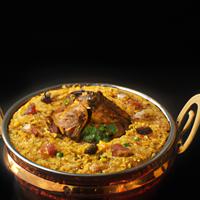
1 serving (300 grams) contains 450 calories, 25.0 grams of protein, 15.0 grams of fat, and 50.0 grams of carbohydrates.

Log this food in SnapCalorie

Nutrition Information
Calories |
354.3 | ||
|---|---|---|---|
% Daily Value* |
|||
| Total Fat | 11.8 g | 15% | |
| Saturated Fat | 4.7 g | 23% | |
| Polyunsaturated Fat | 0 g | ||
| Cholesterol | 47.2 mg | 15% | |
| Sodium | 629.9 mg | 27% | |
| Total Carbohydrates | 39.4 g | 14% | |
| Dietary Fiber | 2.4 g | 8% | |
| Sugars | 3.9 g | ||
| protein | 19.7 g | 39% | |
| Vitamin D | 0 mcg | 0% | |
| Calcium | 39.4 mg | 3% | |
| Iron | 2.4 mg | 13% | |
| Potassium | 315.0 mg | 6% | |
* Percent Daily Values are based on a 2,000 calorie diet. Your daily values may be higher or lower depending on your calorie needs.
Food Attributes
Source of Calories
About Lamb bariyani
Lamb Biryani is a fragrant and flavorful dish originating from the Indian subcontinent, widely celebrated in South Asian cuisine. It consists of tender, marinated lamb cooked with basmati rice, aromatic spices like cinnamon, cardamom, and cloves, and garnished with herbs such as fresh coriander and mint. Often enriched with yogurt and ghee, it delivers a rich and hearty taste. Nutritionally, lamb is a good source of protein, iron, and vitamin B12, supporting muscle health and energy production. The inclusion of spices like turmeric and cumin provides antioxidants with potential anti-inflammatory benefits. However, Lamb Biryani can be calorie-dense due to the use of ghee and fried toppings, and its sodium content may be high depending on preparation. Enjoying it in moderation as part of a balanced diet allows you to savor its complex flavors while being mindful of its indulgent elements.



